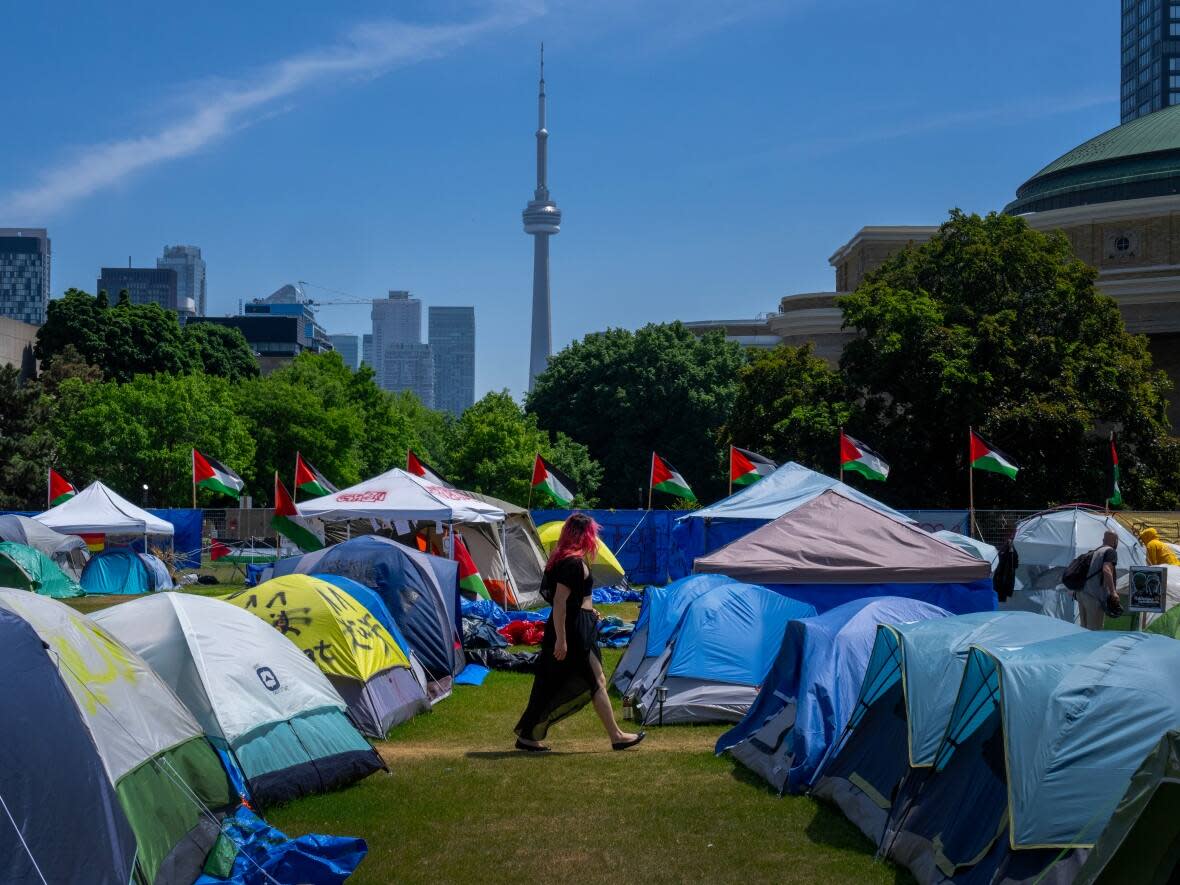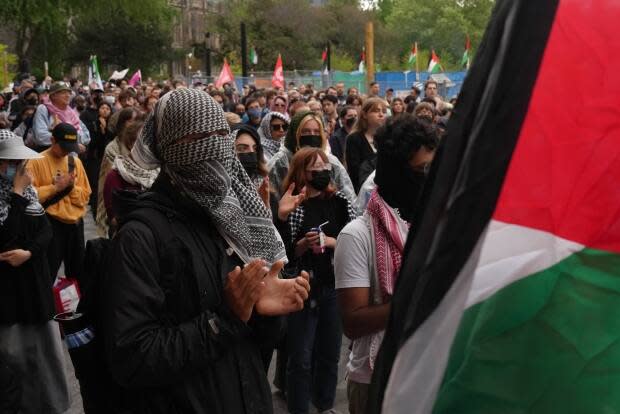U of T files for injunction to evict pro-Palestinian encampment

- Oops!Something went wrong.Please try again later.
The University of Toronto has filed for a court injunction to evict pro-Palestinian protesters encamped on the school's downtown campus, with the student-led demonstrators saying they won't leave until their demands are met.
U of T president Meric Gertler said in an online post Monday that the school's lawyers have requested the Ontario Superior Court of Justice hear the request for an injunction on an expedited basis.
The injunction requests that the court authorize the Toronto Police Service, Ontario Provincial Police and "any other police" to arrest and and remove "persons, objects and structures" at the university encampment.
"In addition to pursuing this legal avenue to return King's College Circle to the university community, we continue to engage in discussions with students representing those in the encampment," Gertler said.
"We remain hopeful that we can reach an agreement and bring the unauthorized encampment to an end."
Those in the camp were served with a trespass notice last week warning students involved in the protest could be suspended, while participating faculty or staff could be fired. The university said it was willing to take "all necessary legal steps" to clear the encampment.
A time for the hearing is expected to be set on Tuesday.
Gertler's latest update came after the demonstrators defied an 8 a.m. ET deadline for the camp to be cleared.
Protesters and their supporters, including some university faculty and staff and members of the Ontario Federation of Labour (OFL), were holding a rally when Gertler's statement was posted online.
The two sides spent Sunday in talks ostensibly aimed at peacefully ending the protest. Gertler said the negotiations were "long and productive" and that discussions would continue Monday.
Protesters say they want commitment, not committees
Speaking at the rally, Sara Rasikh, a U of T graduate student and spokesperson for the encampment, said the talks have failed to produce any meaningful commitments from the school's administration.
"Since day one of our supposed negotiations, the university has never once said that they want to put an end to the Israeli genocide of the Palestinian people, but only that they want to put an end to the student encampment," she told the crowd.
"U of T continues to propose committees, but we want commitments. We want divestment, we want disclosure, and we want it now," Rasikh continued.
At ongoing emergency measures hearings before the International Court of Justice, Israel has repeatedly and strongly denied charges that its campaign in Gaza amounts to genocide.
The encampment at U of T was set up on May 2, part of a massive wave of pro-Palestinian demonstrations at post-secondary institutions in Canada and the United States.
Organizers called on the university to cut its ties with Israel, divest from companies profiting from Israel's offensive in Gaza, and terminate partnerships with the country's academic institutions deemed complicit in the war.
School administrators have already said U of T will not end any partnerships with Israeli universities, and that no matter the outcome of the negotiations, demonstrators must vacate the school's St. George campus.
U of T says it has suffered 'irreparable harm': injunction
In the notice of motion obtained by CBC News Monday, U of T says since the start of the encampment, community members have reported violence, harmful and discriminatory speech and damage to the university's property.
"Members of the university community and the public have expressed serious concerns to the university about their health, safety, security, wellbeing, and freedom of speech and expression as a result of the encampment," the injunction says.
"The university has and will continue to suffer irreparable harm if the occupation and encampment are permitted to continue."
Ten demonstrators are named in the injunction as respondents – six of whom are identified as U of T students, two of whom are believed to be students and two others who have been vocal about the encampment in media interviews and on social media.
The injunction claims community members have reported seeing "deeply disturbing language" in or around the encampment that include messages such as "Zionists go back to Europe", "Glory to the Martyrs" and "Burn Tel Aviv Down".
It adds that following evacuation, the school will require approximately four to six weeks of remediation to repair the damage caused by the encampment.
WATCH | The latest developments in the standoff at U of T:
Erin Mackey, a fourth-year student at U of T and another spokesperson for the protesters, said the university's request for an injunction is meant to inoculate administrators from the optics of calling police in themselves.
"U of T went to court to essentially compel a court to call the police because they don't want to do that, they know it's horrific, optically, to call police on their own students," Mackey told CBC Toronto.
"We will be here, continuing to demand divestment. We are steadfast in our demands and commitments that this university is not complicit in genocide," she said.
Minister says encampment must be 'cleaned up'
On Monday, Minister of Colleges and Universities Jill Dunlop told reporters at Queen's Park that the U of T encampment should be "cleaned up and dealt with right away.
"Convocation is coming up in the next couple of weeks and this is a safety issue and we want to ensure that families feel safe going on campus, that they are not intimidated," Dunlop said.
"The premier and I have been very supportive of ending the encampments."
OFL president Laura Walton said members joined the rally Monday morning because the school's ultimatum amounted to an attempt to "threaten and bully" demonstrators.
"We saw it as an attempt to sidestep good faith negotiations and to wield institutional power to avoid accountability. And we completely reject that," she said.
The Peel Elementary Teachers' Local union similarly expressed their support for the students' right to protest on campus.
"As unionists, we know very well that peaceful protest and freedom of expression and association are fundamental to the labour movement ... and we stand ready to defend them," the union said in a statement issued Monday.
Natalie Rothman, an Israeli-Canadian professor at the school who has participated in the weeks-long protest, said she and other faculty will continue to support the encampment regardless of warnings from administrators.
"I think we are truly fighting here for the soul of the university. We are fighting for what a university really needs to look like," she told CBC Radio's Metro Morning.

"The students have been teaching us for weeks now what a university that is true to its values, to its own core values and mission statement, looks like in terms of speaking truth, seeking truth, asking hard questions and demanding accountability," Rothman said.
She added that any potential police involvement in clearing the encampment would be an "enormous stain on the university."
On Oct. 7, Hamas and other militants attacked southern Israel, killing around 1,200 people and taking more than 250 people hostage, according to Israeli tallies. Israel's subsequent offensive in Gaza against Hamas has killed nearly 36,000 Palestinians, according to local health officials.

